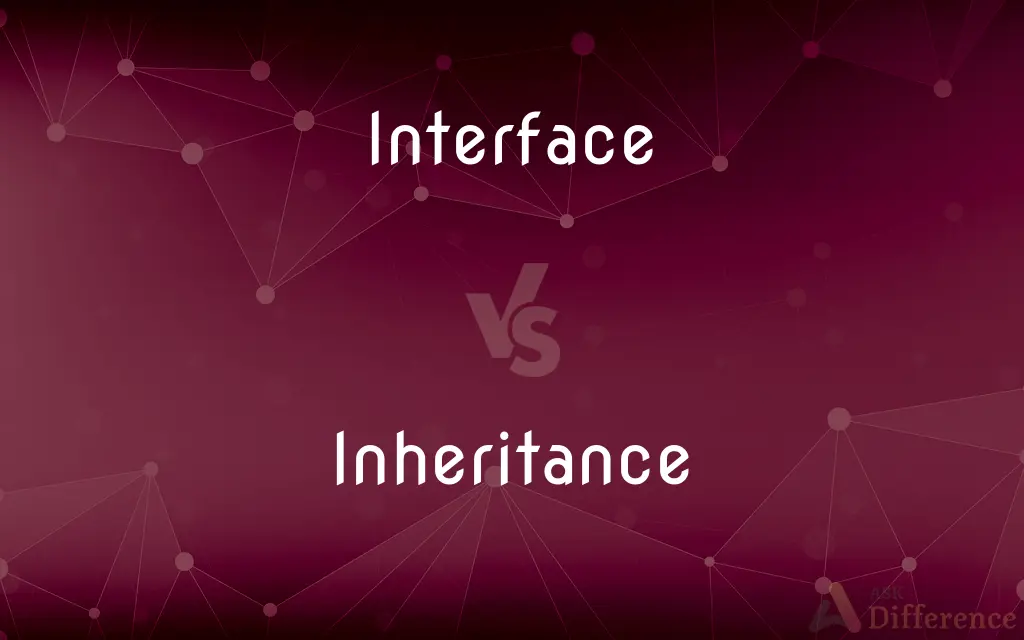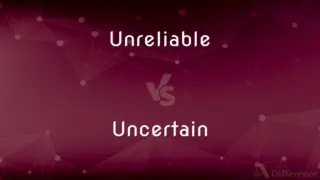Interface vs. Inheritance — What's the Difference?
By Tayyaba Rehman — Published on January 17, 2024
Interface defines a contract for classes without implementing behavior, while inheritance is a mechanism where a class derives properties and behaviors from a parent class.

Difference Between Interface and Inheritance
Table of Contents
ADVERTISEMENT
Key Differences
An interface in programming defines a set of methods that implementing classes must use, without providing the method implementation itself. Inheritance, on the other hand, allows a class to inherit properties and methods from another class, known as the parent or base class.
Interfaces are used to establish a formal contract that a class must adhere to, ensuring a standard structure for classes. Inheritance allows for code reuse, where derived classes can extend or modify behaviors of the base class.
Multiple interfaces can be implemented by a single class, providing flexibility in design and helping to avoid issues related to multiple inheritances. In contrast, most programming languages, like Java and C#, support single inheritance, restricting a class to inherit from only one base class.
With interfaces, there's a clear separation between the definition of a task and its implementation, promoting loose coupling. Inheritance creates a tight coupling between the parent and child classes, as the child class inherits the parent's characteristics.
Interfaces are ideal for defining capabilities that can be shared across different classes, regardless of their place in the class hierarchy. Inheritance is more about creating a relationship between classes that share a logical and direct lineage.
ADVERTISEMENT
Comparison Chart
Definition
Contract for classes without implementation.
Mechanism to derive properties from a parent class.
Flexibility
Allows implementing multiple interfaces.
Typically restricted to single inheritance.
Coupling
Promotes loose coupling.
Creates tight coupling between parent and child.
Usage
Defines capabilities across different classes.
Extends or modifies behavior of the parent class.
Structural Role
Ensures standard structure for classes.
Facilitates code reuse and logical hierarchy.
Compare with Definitions
Interface
An interface is a contract in programming that specifies methods a class must implement.
The Serializable interface in Java indicates that a class can be serialized.
Inheritance
Inheritance is a feature in object-oriented programming where a class inherits properties from another class.
In Java, the HashSet class inherits from the AbstractSet class.
Interface
Interfaces support the implementation of multiple inheritances in languages like Java.
A class in Java can implement multiple interfaces like Runnable and Serializable.
Inheritance
It allows a derived class to reuse code from its base class.
A Bird class inherits common features from an Animal class.
Interface
Interfaces are used to achieve polymorphism in object-oriented programming.
Multiple classes implement the List interface in Java, providing different ways to handle lists.
Inheritance
It enables the creation of a child class that is a specialization of the parent class.
The ElectricCar class inherits from the general Car class and adds specific attributes.
Interface
It defines abstract methods without providing their implementation.
The OnClickListener interface in Android development must be implemented to handle click events.
Inheritance
Inheritance promotes code reuse and hierarchical classification.
The Employee class inherits basic attributes from a Person class.
Interface
They allow for separation of definition from implementation.
An interface Shape defines draw() and color() methods, which different shapes implement.
Inheritance
Inheritance can lead to hierarchical relationships in software design.
In a graphics system, Circle and Rectangle classes inherit from a Shape class.
Interface
A surface forming a common boundary between adjacent regions, bodies, substances, or phases.
Inheritance
The action of inheriting something
The inheritance of property from a relative.
Interface
A point at which independent systems or diverse groups interact
"the interface between crime and politics where much of our reality is to be found" (Jack Kroll).
Inheritance
Something inherited or to be inherited
Her inheritance included a large estate.
Interface
A system of interaction or communication between a computer and another entity such as a printer, another computer, a network, or a human user.
Inheritance
Something regarded as a heritage
The cultural inheritance of Rome.
Interface
A device, such as a cable, network card, monitor, or keyboard, that enables interaction or communication between a computer and another entity.
Inheritance
The process of genetic transmission of characteristics from parent or ancestor to offspring.
Interface
The layout or design of the interactive elements of a computer program, an online service, or an electronic device.
Inheritance
A characteristic so inherited.
Interface
To join by means of an interface.
Inheritance
The sum of genetically transmitted characteristics.
Interface
To serve as an interface for.
Inheritance
The passing of title to an estate upon death.
Interface
To serve as an interface or become interfaced.
Inheritance
(countable) That which a person is entitled to inherit, by law or testament.
Interface
Usage Problem To interact or coordinate smoothly
"Theatergoers were lured out of their seats and interfaced with the scenery" (New York Times).
Inheritance
The act or mechanism of inheriting; the state of having inherited
The Indo-European languages share various similarities as a result of their inheritance from a common ancestor.
Interface
The point of interconnection or contact between entities.
Public relations firms often serve as the interface between a company and the press.
Inheritance
The biological attributes passed hereditarily from ancestors to their offspring.
Interface
A thin layer or boundary between different substances or two phases of a single substance.
If water and oil are mixed together, they tend to separate, and at equilibrium they are in different strata with an oil-water interface in between.
The surface of a lake is a water-air interface.
Inheritance
The mechanism whereby parts of a superclass are available to instances of its subclass.
Interface
(computing) The point of interconnection between systems or subsystems.
The data is sent over the air interface to the remote system.
Inheritance
The act or state of inheriting; as, the inheritance of an estate; the inheritance of mental or physical qualities.
Interface
(computing) The connection between a user and a machine.
The options are selected via the user interface.
Inheritance
That which is or may be inherited; that which is derived by an heir from an ancestor or other person; a heritage; a possession which passes by descent.
When the man dies, let the inheritanceDescend unto the daughter.
Interface
The connection between parts of software; also the public or published sections of an object or module,
This interface is implemented by several Java classes.
Traits are somewhat between an interface and a mixin, as an interface contains only method signatures, while a trait includes also the full method definitions; on the other side mixins include method definitions, but they can also carry state through attributes, while traits usually don't.
Inheritance
A permanent or valuable possession or blessing, esp. one received by gift or without purchase; a benefaction.
To an inheritance incorruptible, and undefiled, and that fadeth not away.
Interface
In object-oriented programming, a piece of code defining a set of operations that other code must implement.
The Audio and Video classes both implement the IPlayable interface.
Inheritance
Possession; ownership; acquisition.
To you th' inheritance belongs by rightOf brother's praise; to you eke 'longs his love.
Interface
(biochemistry) The internal surface of a coiled protein (compare exoface).
Inheritance
Transmission and reception by animal or plant generation.
Interface
(transitive) To construct an interface for.
Inheritance
A perpetual or continuing right which a man and his heirs have to an estate; an estate which a man has by descent as heir to another, or which he may transmit to another as his heir; an estate derived from an ancestor to an heir in course of law.
Men are not proprietors of what they have, merely for themselves; their children have a title to part of it which comes to be wholly theirs when death has put an end to their parents' use of it; and this we call inheritance.
Interface
(ambitransitive) To connect through an interface.
Inheritance
Hereditary succession to a title or an office or property
Interface
(intransitive) To serve as an interface.
Inheritance
That which is inherited; a title or property or estate that passes by law to the heir on the death of the owner
Interface
To meet for discussion.
Let's interface on Wednesday.
Inheritance
(genetics) attributes acquired via biological heredity from the parents
Interface
A surface forming a common boundary between two things, especially between two fluids.
Inheritance
Any attribute or immaterial possession that is inherited from ancestors;
My only inheritance was my mother's blessing
The world's heritage of knowledge
Interface
Hardware that links one device with another (especially a computer).
Interface
That part of a computer program which controls the way a program interacts with a user; the manner of inputting and outputting of data, and the way information is presented on a computer monitor; also called user interface; as, a graphical user interface; a character-based interface.
Interface
(chemistry) a surface forming a common boundary between two things (two objects or liquids or chemical phases)
Interface
(computer science) a program that controls a display for the user (usually on a computer monitor) and that allows the user to interact with the system
Interface
The overlap where two theories or phenomena affect each other or have links with each other;
The interface between chemistry and biology
Interface
(computer science) computer circuit consisting of the hardware and associated circuitry that links one device with another (especially a computer and a hard disk drive or other peripherals)
Common Curiosities
Do interfaces contain method implementations?
No, interfaces only define method signatures without implementations.
Are interfaces used to define properties?
Interfaces typically define behaviors (methods), not properties.
What is the primary role of an interface in programming?
An interface defines a contract or set of methods that classes must implement.
Is multiple inheritances allowed in languages like Java and C#?
No, these languages support single inheritance but allow multiple interfaces.
Why is inheritance important in programming?
Inheritance facilitates code reuse and establishes a natural hierarchy between classes.
Can inheritance lead to tightly coupled code?
Yes, inheritance can create tight coupling between parent and child classes.
Can a class implement multiple interfaces?
Yes, a class can implement multiple interfaces, allowing for flexibility in design.
What is the advantage of using interfaces?
Interfaces provide loose coupling and flexibility in implementing different behaviors.
How does inheritance work in object-oriented programming?
Inheritance allows a class to inherit properties and methods from another class.
How do interfaces promote polymorphism?
Interfaces enable different classes to implement the same methods in diverse ways.
How does inheritance support code reuse?
Inheritance allows a child class to reuse code and properties from its parent class.
Is it possible for a class to both inherit from a class and implement an interface?
Yes, a class can inherit from one class and implement one or more interfaces.
What kind of relationship is established through interfaces?
Interfaces establish a contractual relationship, ensuring a class implements certain methods.
Can a class inherit from multiple parent classes?
In languages like Java and C#, a class can only inherit from one parent class.
What is an example of inheritance in standard libraries?
The standard Java library's ArrayList class inherits from the AbstractList class.
Share Your Discovery

Previous Comparison
Slazenger Logo vs. Puma Logo
Next Comparison
Unreliable vs. UncertainAuthor Spotlight
Written by
Tayyaba RehmanTayyaba Rehman is a distinguished writer, currently serving as a primary contributor to askdifference.com. As a researcher in semantics and etymology, Tayyaba's passion for the complexity of languages and their distinctions has found a perfect home on the platform. Tayyaba delves into the intricacies of language, distinguishing between commonly confused words and phrases, thereby providing clarity for readers worldwide.













































